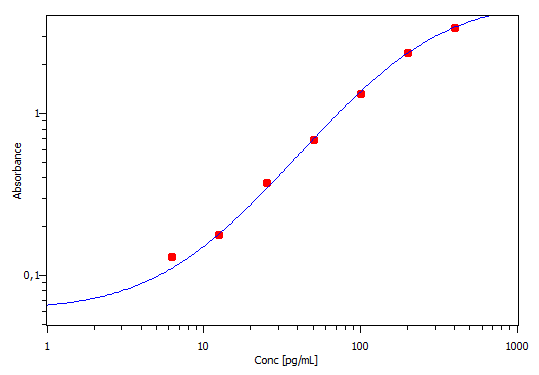Mouse Oncostatin M (OSM) DuoSet ELISA Summary
* Provided that the recommended microplates, buffers, diluents, substrates and solutions are used, and the assay is run as summarized in the Assay Procedure provided.
Product Features
- Optimized capture and detection antibody pairings with recommended concentrations save lengthy development time
- Development protocols are provided to guide further assay optimization
- Assay can be customized to your specific needs
- Economical alternative to complete kits
Kit Content
- Capture Antibody
- Detection Antibody
- Recombinant Standard
- Streptavidin conjugated to horseradish-peroxidase (Streptavidin-HRP)
Other Reagents Required
PBS: (Catalog # DY006), or 137 mM NaCl, 2.7 mM KCl, 8.1 mM Na2HPO4, 1.5 mM KH2PO4, pH 7.2 - 7.4, 0.2 µm filtered
Wash Buffer: (Catalog # WA126), or equivalent
Reagent Diluent*
Blocking Buffer*
Substrate Solution: 1:1 mixture of Color Reagent A (H2O2) and Color Reagent B (Tetramethylbenzidine) (Catalog # DY999)
Stop Solution: 2 N H2SO4 (Catalog # DY994)
Microplates: R&D Systems (Catalog # DY990), or equivalent
Plate Sealers: ELISA Plate Sealers (Catalog # DY992), or equivalent
*For the Reagent Diluent and Blocking Buffer recommended for a specific DuoSet ELISA Development Kit, please see the product
Scientific Data
Product Datasheets
Preparation and Storage
Background: Oncostatin M/OSM
Oncostatin M (OSM) is a cytokine originally isolated from medium conditioned by PMA-treated U-937 human histiocytic leukemia cells based on its ability to inhibit growth of A375 melanoma cells. The human OSM cDNA encodes a 252 amino acid pre-pro-OSM polypeptide with a 25 residue hydrophobic signal peptide and a hydrophilic C-terminal domain that are proteolytically processed to generate the 196 residue mature form of OSM. Although both mature and pro-OSM are equally active in radio-receptor assays, the mature OSM is 5- to 60-fold more active in growth inhibition assays. Thus, proteolytic processing of the pro-OSM peptide may be important in regulating the in vivo activities of OSM. OSM initiates its biological activities by binding to specific cell surface receptors. The gp130, a signal transducing component (beta subunit) of the IL-6, LIF and CNTF receptor complexes, was identified as a low-affinity OSM receptor that does not transduce OSM signals. The low affinity LIF receptor (LIF R, a gp130-related protein) has now been identified to be a component of a high-affinity OSM receptor that will transduce OSM signals. Since OSM is also active on cells that do not express LIF R, a specific OSM receptor that does not involve LIF R must also exist. Besides its growth inhibitory activities on human A375 melanoma and mouse M1 myeloid leukemic cells, as well as on other solid tumor cells, OSM also has growth stimulatory activities on normal fibroblasts, AIDS-Kaposis sarcoma cells, and a human erythroleukemia cell line, TF-1. Other OSM-mediated activities reported to date include: stimulation of plasminogen activator activity in cultured bovine aortic endothelial cells, regulation of IL-6 expression in human endothelial cells, and stimulation of LDL uptake and up-regulation of cell surface LDL receptors in HepG2 cells.
Human Oncostatin M (OSM) signals through two types of human OSM receptor complexes: the type I complex comprising the leukemia inhibitory factor receptor beta (LIF R beta) and gp130 and the type II complex made up of OSM receptor beta (OSM R beta) and gp130. In contrast, mouse OSM signals only through the mouse OSM R beta and gp130 complex. Human and mouse OSM R beta are 55% identical at the amino acid sequence level.
Citations for Mouse Oncostatin M (OSM) DuoSet ELISA
R&D Systems personnel manually curate a database that contains references using R&D Systems products. The data collected includes not only links to publications in PubMed, but also provides information about sample types, species, and experimental conditions.
5
Citations: Showing 1 - 5
Filter your results:
Filter by:
-
BASOPHILS ACTIVATE PRURICEPTOR-LIKE VAGAL SENSORY NEURONS
Authors: Wang, JC;Nikpoor, AR;Crosson, T;Kaufmann, E;Rafei, M;Talbot, S;
bioRxiv : the preprint server for biology
Species: Mouse
Sample Types: Cell Culture Supernates
-
Heterocellular OSM-OSMR signalling reprograms fibroblasts to promote pancreatic cancer growth and metastasis
Authors: BY Lee, EKJ Hogg, CR Below, A Kononov, A Blanco-Gom, F Heider, J Xu, C Hutton, X Zhang, T Scheidt, K Beattie, A Lamarca, M McNamara, JW Valle, C Jørgensen
Nature Communications, 2021-12-17;12(1):7336.
Species: Mouse
Sample Types: Tissue Homogenates
-
IL-33 Mediates Lung Inflammation by the IL-6-Type Cytokine Oncostatin M
Authors: F Botelho, A Dubey, EA Ayaub, R Park, A Yip, A Humbles, R Kolbeck, CD Richards
Mediators of Inflammation, 2020-11-28;2020(0):4087315.
Species: Mouse
Sample Types: BALF
-
Treponema denticola stimulates Oncostatin M cytokine release and de novo synthesis in neutrophils and macrophages
Authors: MM Jones, ST Vanyo, W Ibraheem, A Maddi, MB Visser
J. Leukoc. Biol., 2020-07-17;0(0):.
Species: Mouse
Sample Types: Cell Lysates
-
Endoplasmic reticulum stress differentially modulates the IL-6 family of cytokines in murine astrocytes and macrophages
Authors: CL Sanchez, SG Sims, JD Nowery, GP Meares
Sci Rep, 2019-10-17;9(1):14931.
Species: Mouse
Sample Types: Cell Culture Supernates
FAQs
No product specific FAQs exist for this product, however you may
View all ELISA FAQsReviews for Mouse Oncostatin M (OSM) DuoSet ELISA
Average Rating: 4 (Based on 1 Review)
Have you used Mouse Oncostatin M (OSM) DuoSet ELISA?
Submit a review and receive an Amazon gift card.
$25/€18/£15/$25CAN/¥75 Yuan/¥2500 Yen for a review with an image
$10/€7/£6/$10 CAD/¥70 Yuan/¥1110 Yen for a review without an image
Filter by:


